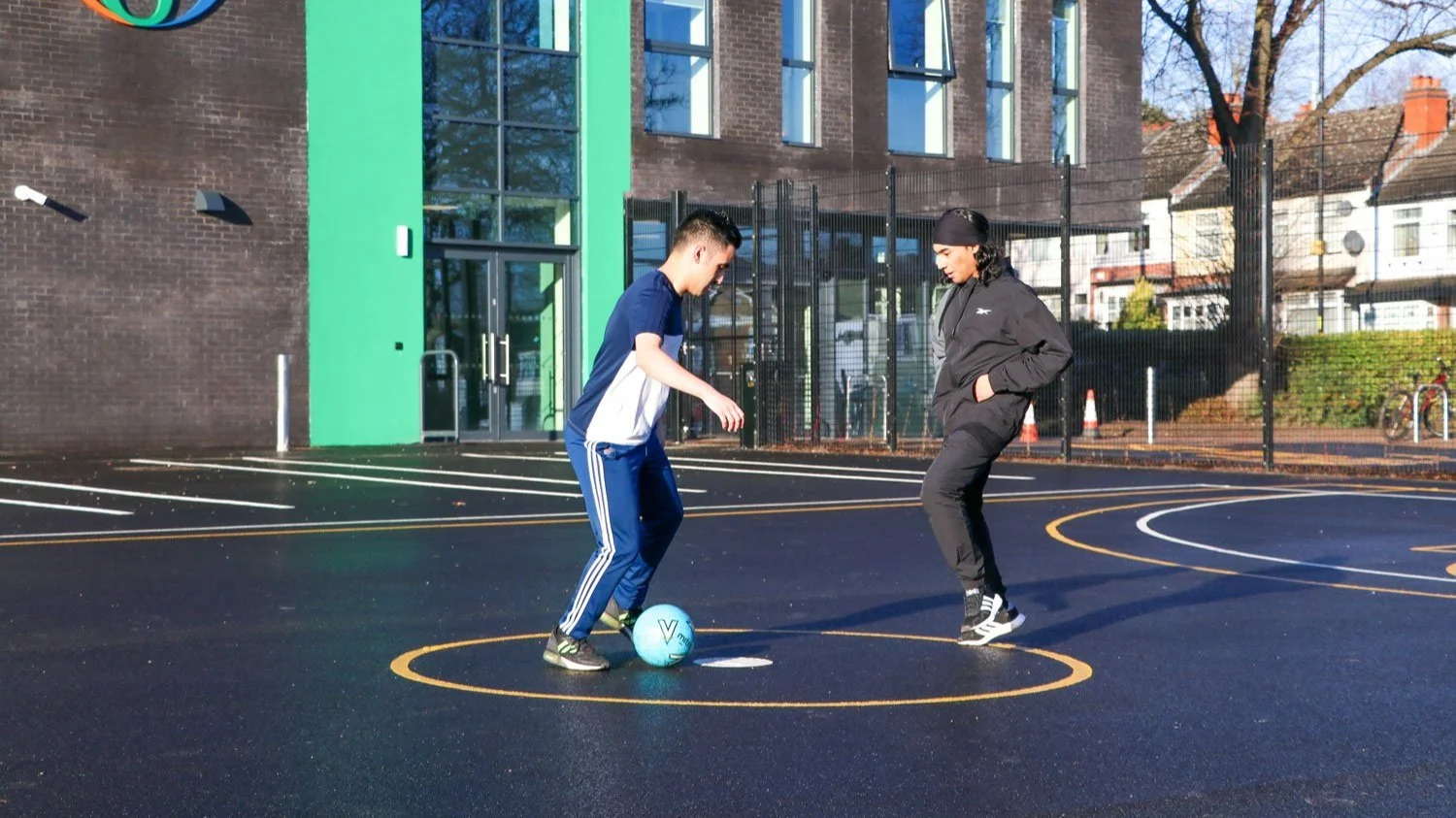Article 12: Every child has the right to have a say in all matters affecting them, and to have their views taken seriously.
Article 31: Leisure, play and culture - Every child has the right to relax, play and take part in a wide range of cultural and artistic activities.
We are a Unicef Rights Respecting School. The Rights Respecting School Award puts children's rights at the heart of schools in the UK.
We aim to be a safe and inspiring place to learn, where children are respected, their talents and nurtured and they are able to thrive.
The Rights Respecting Schools Award embeds these values in daily school life at Oscott Manor School and gives children the best chance to lead happy, healthy lives and to be responsible, active citizens.
Sixth Form
The Pioneers and Discoverers pathways Sixth Form provision is based off the main site at Ryland Road. With the Explorers Sixth Form pathway based on the main Oscott Manor site.
Pioneers and Discoverers pathways students are given three options in Sixth Form. Whereas the Explorer pathway will experience options on a rotation from Block B and C listed below. All pupils study a core curriculum which includes English, Maths, Preparing for Adulthood, ICT, and Employability. Pupils attend an options day at the end of year 11 where they will be able to speak to staff regarding the options, they take during sixth form. If a pupil has completed English and Maths at a GCSE grade 4, they do not need to carry these subjects on in Sixth Form.
Sixth Form (Year 12-14) prepares pupils for life beyond Oscott Manor. It is a 1 year rolling programme meaning they may be entered to exams each year and pupils may move on to other provisions/ courses of study when they are ready to do so.
|
Key Outcomes |
Preparing for Post 19 |
|
Employment |
Build on strengths and interests highlighted in personal / vocational profile, apprenticeships, supported internships, traineeships, further work on academic and vocational qualifications, A-levels and planning for university including sharing EHC plan with disabled pupils allowance study needs assessor, CV writing, skills in applying for jobs or higher education, interviewing, understanding support from the LA, e.g., do they have a supported employment service? |
|
Independent Living |
Managing bills (e.g., mobile phone), managing potential income including personal independence payments, residential and local learning options, mental capacity - decision making, understanding consent and best interest, life skills, managing your time, transition to adult care, being safe in your home, understanding different types of living arrangements - what arrangements are positive and possible for each YP, actively planning for future living arrangements with family, LA etc. |
|
Community Inclusion |
Developing new friendships, personal budgets - how could they be spent post 16 to further PFA aspirations, managing your time, being safe on the streets, understanding alcohol and drugs, volunteering, understanding the criminal justice system, knowing where to go for help and how to use the emergency services. |
|
Health |
Taking responsibility for dental and optical appointments, managing own health, transition to adult health services, knowing when you need to see the GP, staying physically active and healthy, understanding relationships, including sexual relationships - choices, safety and good health. |
|
Pioneers |
Discoverers |
Explorers |
|
English x4 |
English x4 |
English x5 |
|
Maths x4 |
Maths x4 |
Maths x5 |
|
Preparing for Adulthood x2 |
Preparing for Adulthood x2 |
Preparing for Adulthood /Life skills x2 |
|
ICT x1 |
ICT x1 |
ICT x1 |
|
Employability x1 |
Employability x1 |
Employability x1 |
|
Enrichment x2 |
Enrichment x2 |
Enrichment x2 |
|
Option Block A (Vocational) x1 day |
Option Block A (Vocational) x1 day |
Option Rotation x3 |
|
Option Block B x3 |
Option Block B x3 |
Option Rotation x3 |
|
Option Block C x3 |
Option Block C x3 |
Option Rotation x3 |
Some of the vocational options are delivered off site and consist of the following:
Construction (Riverside)
Hair and Beauty (Riverside)
Media ((Blue Whale)
Land based Studies/ Animal Care (Riverside)
Horticulture (Thrive)
Enterprise/ Retail (Main Site)
Sixth Form Assessment
Preparing for Adulthood, Life Skills, Enrichment and Employability are non-accredited subjects but prepare pupils for life beyond the sixth form provision. Options subjects are accredited by an appropriate exam board for that subject. English and Maths are accredited through AQA Entry Level to GCSE.
Option Block B and C:
Media
Sport
Hospitality
Health and Social Care
Art and Design
Performing Arts
Music
Retail and Enterprise
Independence and Communication
We place a strong emphasis on fostering independence throughout all aspects of the school day. Independence is crucial to our pupils:
Empowerment: Developing independence empowers pupils, giving them the confidence to take control of their own learning and daily activities.
Life Skills: It equips students with essential life skills, preparing them for adulthood and enabling them to navigate the world more effectively.
Self-Esteem: Achieving independence boosts self-esteem and fosters a sense of accomplishment, which is vital for personal growth and well-being.
Individual Growth: It encourages personal growth and development, allowing students to reach their full potential.
Social Integration: Independence helps students integrate better into society by enhancing their ability to communicate, make decisions, and interact with others.
Future Opportunities: It opens up more opportunities for future education, employment, and independent living.
Communication is a core focus and developing communications is a school priority. All staff receive regular training in the area of communication from internal and external specialists. We use various methods such as:
Photos, Objects of reference, Makaton, Picture Exchange, Social Stories, Intensive Interaction, Visual timetables, Aided Language displays, Communication books, Alternative and Augmentative Communication methods.
Assemblies
Here at Oscott Manor, we take a thematic approach to assemblies, focusing upon developing our pupils' understanding of the world around them in which they live, encouraging them to develop and grow as young people.
Our assemblies explore important events in human history such as VE day, important historical figures such as Nelson Mandela, celebrate diversity through autism awareness and encourage positive behaviour by discussing moral values such as empathy and kindness.
We tailor our approach to meet the need of our students and therefore hold four separate assemblies throughout the week from Tuesday to Friday during AM registration. For the Explorers pathway this would be delivered through a sensory approach.
Reflection Time
Reflection Time is a dedicated period scheduled daily for form classes to pause and reflect on their experiences throughout the school day. This practice aims to foster a supportive environment where students can:
Review and Consolidate Learning:
Academic Reflection: Students can think about what they have learned in their lessons, identify areas of understanding, and recognise topics that may need further clarification.
Goal Setting: Encourages students to set personal academic goals and plan steps to achieve them.
Personal Growth and Development:
Self-Assessment: Provides an opportunity for students to assess their own progress, strengths, and areas for improvement.
Mindfulness: Promotes mindfulness practices, helping students to stay present and manage stress.
Social and Emotional Well-being:
Peer Interaction: Allows students to share their thoughts and feelings with classmates, fostering a sense of community and support.
Emotional Expression: Encourages students to express their emotions and reflect on their social interactions throughout the day.
Problem-Solving and Decision-Making:
Conflict Resolution: Helps students to reflect on any conflicts or challenges they face and consider ways to resolve them.
Critical Thinking: Encourages critical thinking about daily experiences and decisions.
Teacher Support and Guidance:
Feedback: Provides a platform for teachers to offer feedback and guidance based on students' reflections.
Mentorship: Allows teachers to mentor students, helping them navigate academic and personal challenges.
Incorporating Reflection Time into the daily schedule, creates a nurturing environment that supports holistic development, enhances learning outcomes, and promotes overall well-being.
Long and Medium-Term Planning
Development of Long-Term Plans:
The aims of the curriculum are shown through the long-term plan aligning to the school’s ethos and values. They outline the content that will be taught, detailing the themes, topics and units that will be covered in each subject.
The plans include a timeline, specifying when each topic or unit will be taught. This helps ensure that all necessary content is covered. They also state where the content has been obtained from.
All long-term plans are made available on the school’s website, ensuring that it is accessible to all teachers, students, and parents. This transparency helps everyone to understand the educational journey and expectations for each year.
Teachers use the long-term plan to develop medium-term plans, which break down the curriculum goals into more detailed units or topics to be covered over several weeks or months. The medium-term plans include more specific details about the learning objectives, activities, assessments, and resources needed for each unit.
We conduct regular checks to monitor the implementation of the long-term plans. This includes reviewing progress, assessing student understanding, and making any necessary adjustments.
Teaching strategies
We employ a diverse array of teaching strategies to effectively address the unique needs of our pupils. These strategies include, but are not limited to:
Adapted Teaching
Attention Autism
Precision Teaching
Attention Autism
Individual and Group Work/Flexible Grouping
Intensive Interaction
Picture Exchange
Maths Mastery
Continuous Provision
Social Stories
Scaffolded Learning
Structured Environments
Curriculum Impact
Curriculum Impact at Oscott Manor Special School for pupils with autism is profound and multifaceted. Our tailored curriculum is designed to support the diverse needs of our pupils, promoting independence, communication skills, and positive social interactions. Through adapted teaching and personalised learning targets, we ensure that each pupil can access and engage with the curriculum in a meaningful way.
Our emphasis on Reflection Time and Assemblies provides pupils with opportunities to develop self-awareness and emotional regulation, key components for navigating daily life. Long-Term and Medium-Term Planning allow us to set realistic and achievable goals for our pupils, ensuring that they make consistent progress in their learning journeys.
Teaching strategies at Oscott Manor are evidence-based and continuously refined to meet the evolving needs of our pupils. We employ a range of approaches, including visual supports, sensory integration, and structured environments, to create a supportive and effective learning atmosphere.
The impact of our curriculum is evident in the destination outcomes for our pupils. Our pupils go on to further education, vocational training, or employment, equipped with the skills and confidence needed to succeed. Our outcomes demonstrate that our approach not only meets academic needs but also prepares pupils for a fulfilling and independent life beyond Oscott Manor.





